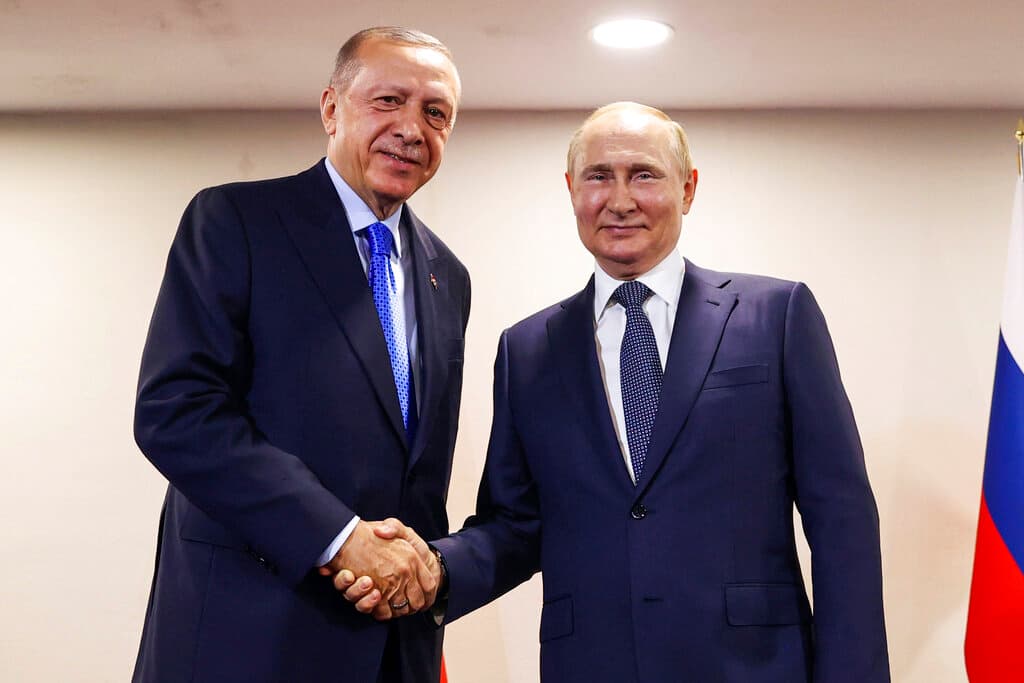Washington Warns Turkey on Military Exports to Russia, Britain Braces for Riots, and Mideast Tensions Soar
Press Review: It’s August and the Olympics are on, but everybody seems more than a little anxious — for good reason.

Two-faced Turkey? It wouldn’t be the first time, but now Washington is calling out Ankara over some of its duplicitous commercial dealings with Moscow. The Secretary of Commerce, Matthew Axelrod, has recently met with Turkish officials at Ankara and Istanbul, the Financial Times reports, and warned that Turkey will face “consequences” if it does not curtail exports of American technology to Russia that could have military uses.
Washington believes that Western electronics, otherwise proscribed by sanctions, are entering Russia through Turkey. The Department of Commerce already requires American companies to obtain permission in order to sell “sensitive components” to 18 Turkish companies, and that list could be expanded.
Mr. Alexrod told the FT that “We need Turkey to help stop the illegal flow of American technology to Russia. We need to see progress, and fast, from Turkish government and industry, or we will have no choice but to sanction those who circumvent our export controls.”
He specified that Turkey needs to work harder to limit trade in American chips and other components and added that Moscow was “trying to exploit Turkey’s trade policy” to gain access to American technology.
Turkey has long leveraged its position on the edge of two continents, Europe and Asia, to be something of a regional middleman. That role can be helpful, as with helping to secure the safe passage of Ukrainian grain across the Black Sea and helping to coordinate the recent Russian-American prisoner exchange. But it can be prickly too: President Erdogan last month threatened to invade Israel, and periodically lobs similar taunts at fellow NATO-member Greece.
Commercial maritime trade can be tricky to monitor at the best of times, particularly east of the Bosphorus, and Russian tourists still travel to Turkey in droves. Time will tell if American pressure works on the Turks.
*
Britain, meantime, is bracing for more riots. Earlier this week Prime Minister Starmer said that a “standing army” of specially-trained police would be deployed to quell the recent rioting. The justice system will also be bolstered in order to handle hundreds of arrests after violent disorder rocked cities across the nation over the past week.
Mr. Starmer has blamed the violence on “far right thuggery” and singled out Elon Musk for fanning the flames of online discontent.
Mr. Musk recently posted to his X social media platform that “Civil war is inevitable” in the United Kingdom, even suggesting that the British criminal justice system treats Muslims more leniently than far-right activists and compared Britain’s crackdown on social media users to Soviet-style tactics.
On Tuesday the justice minister, Heidi Alexander, told Times Radio that the “Use of language such as a ‘civil war’ is in no way acceptable.” Ms. Alexander added that “We are seeing police officers being seriously injured, buildings set alight, and so I really do think that everyone who has a platform should be exercising their power responsibly.”
Whether the gamut of British media is acting responsibly is an open question. There has in recent days been blanket coverage on news networks like Sky of some demonstrations that turned violent, with instances of altercations between police officers and protestors replayed — arguably whipping up tensions as much or more than mostly amorphous social media posts.
While the violence is seemingly as much a response to government inaction on illegal immigration as anything else, the British press seem convinced that it is mainly about targeting Muslims — many of whom reside in the country legally, and some of whom do not.
Some self-styled patriotic (or far-right, depending on one’s perspective) groups have claimed that Muslims are planning to riot; police tend to downplay those claims and even refrain from using the word “Muslim” as if doing so itself could inflame tensions.
In any event, demonstrations were anticipated in at least 30 locations across the United Kingdom on Wednesday, with an additional 6,000 police officers reportedly deployed.
*
Tensions in the Middle East are soaring and the fuse that Hamas lit with its murderous attacks on Israel exactly ten months ago is burning hotter than ever. From Iran and its yes-men in the Lebanese terrorist group Hezbollah, the catalog of threats grows thicker by the day.
As it does, so does Israeli and, more behind the scenes, American resolve to counter those threats. Wars, however, have a dynamic of their own and it raises the question: could a regional conflagration in the Middle East go nuclear?
Israel has a longstanding policy of strategic ambiguity over nuclear weapons, refusing to confirm or deny if it possesses any. That makes it difficult to predict whether an anticipated attack by Hezbollah or Tehran (or both) could trigger a nuclear response.
Tensions in the region spiked following the assassination last week of a Hezbollah “commander,” Fuad Shukur, at Beirut and Hamas’ “political” chief Ismail Haniyeh at Tehran. For both Hezbollah and Tehran, creating a sense of panic among Israelis is likely part of and precursor to any actual attack.
There appear to be several efforts afoot to dial down the pressure and exert diplomatic pressure on Tehran. In a statement issued Sunday, the Group of Seven foreign ministers of Canada, France, Germany, Italy, Japan, the United Kingdom, and America expressed their “deep concern at the heightened level of tension in the Middle East which threatens to ignite a broader conflict in the region.”
The ministers urged “all involved parties once again to refrain from perpetuating the current destructive cycle of retaliatory violence, to lower tensions and engage constructively toward de-escalation. The statement added that “no country or nation stands to gain from a further escalation in the Middle East.”

